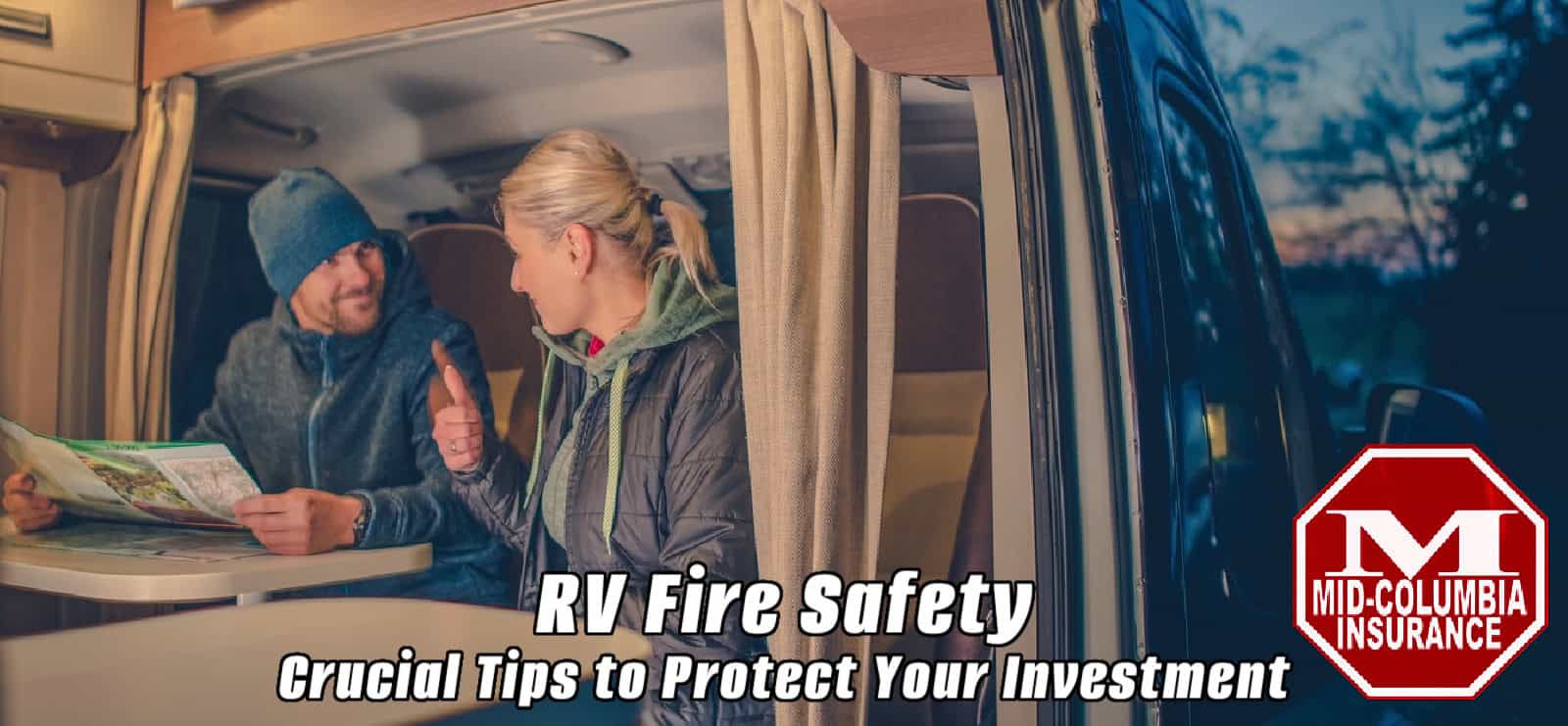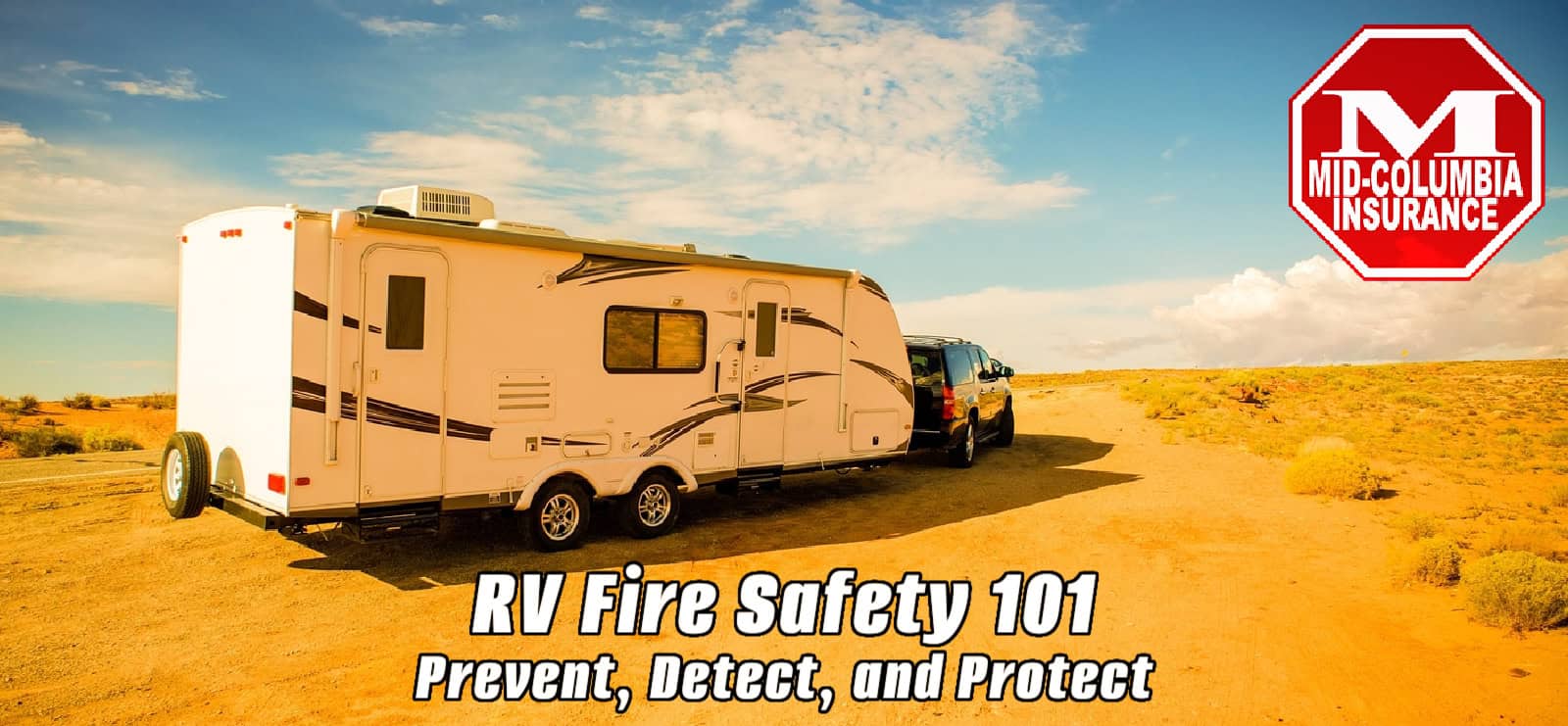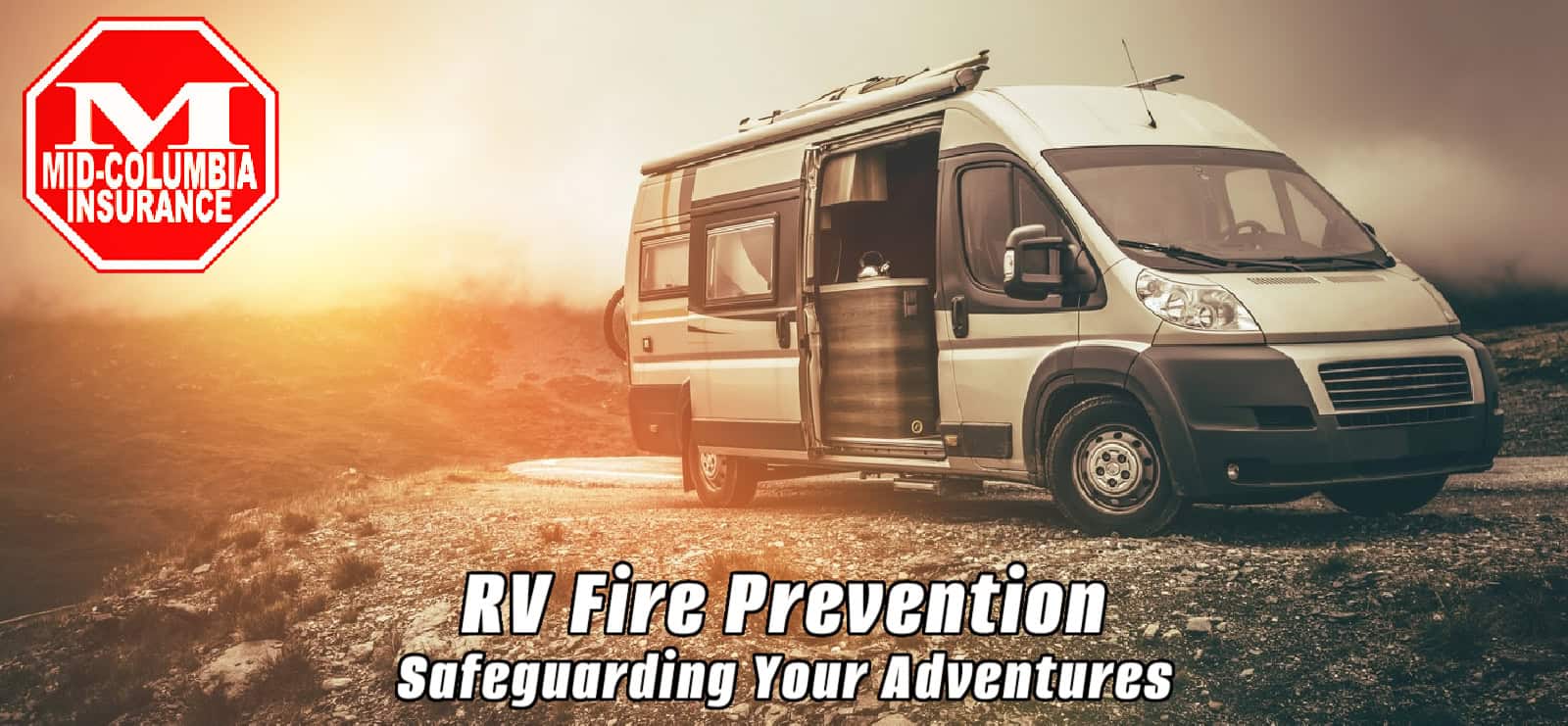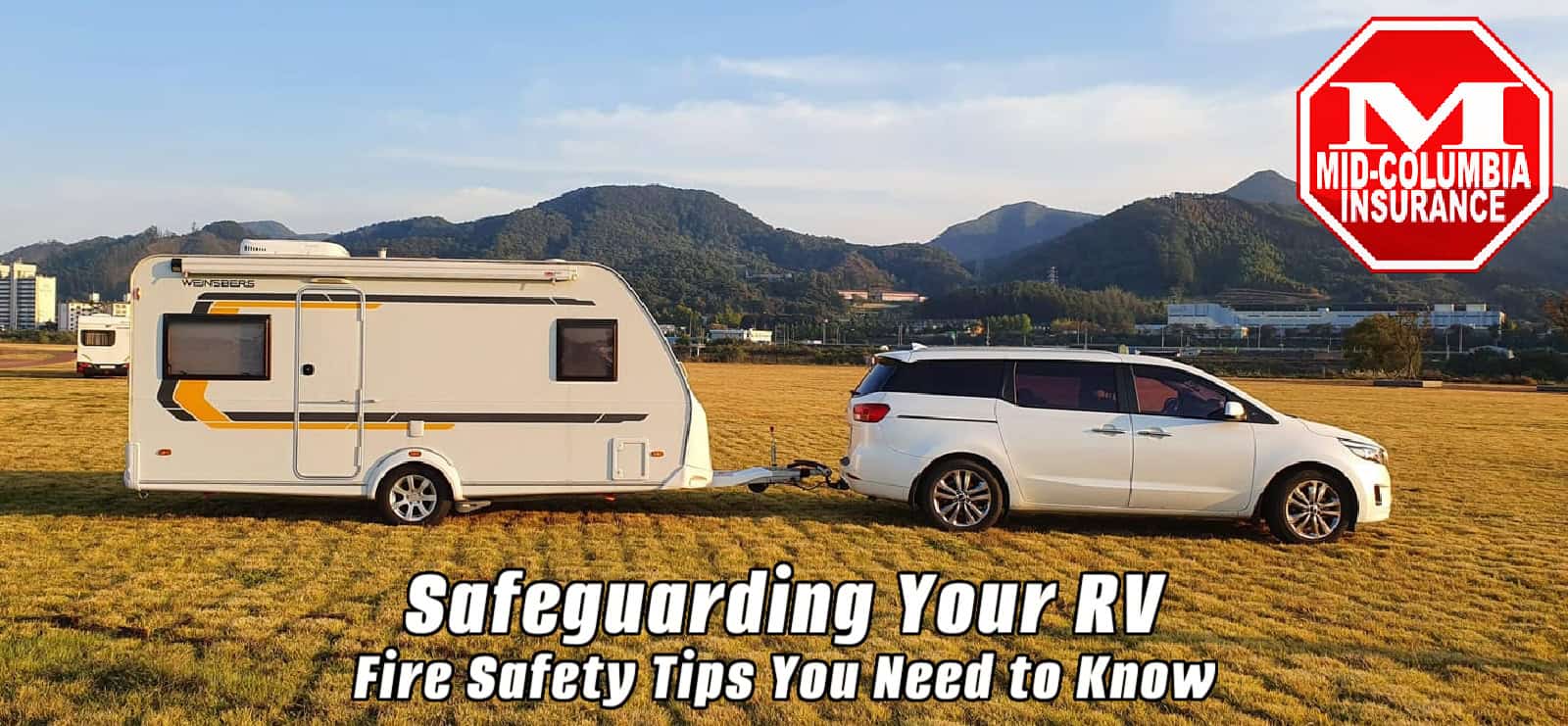
Understanding the Risks of RV Fire Hazards
Recreational vehicles (RVs) provide a wonderful way to explore the great outdoors and spend quality time with family and friends. However, these mobile living spaces come with unique fire risks that every RV owner should be aware of. In this article, we’ll explore the common causes of RV fires, prevention strategies, and the importance of having the right insurance coverage to protect your investment.
As Gary Paulson, owner of Mid-Columbia Insurance, states, “RV fires can be devastating, not only in terms of property damage but also the potential for injury or loss of life. It’s crucial that RV owners understand the risks and take proactive steps to mitigate them.”
Common Causes of RV Fires
Several factors can contribute to the start and spread of fires in recreational vehicles. Some of the most common causes include:
- Electrical malfunctions: Overloaded circuits, faulty wiring, and damaged appliances can lead to electrical fires.
- Propane leaks: Damaged propane tanks, loose connections, and faulty regulators can result in leaks that ignite.
- Cooking accidents: Unattended cooking, grease fires, and combustible materials near the stove are common culprits.
- Heating system failures: Malfunctioning furnaces, improperly vented heaters, and overheated fireplaces can cause fires.
- Engine issues: Mechanical problems in the engine compartment can lead to fires.
- Flammable liquid spills: Gasoline, oil, and other flammable liquids can ignite if not handled properly.
- Careless smoking: Discarded cigarettes or ashes can quickly start a fire, especially in dry conditions.

Preventing RV Fires: Best Practices
Fortunately, there are several steps RV owners can take to minimize the risk of fires in their motorhomes, travel trailers, and campers. Implementing these best practices can help keep you, your loved ones, and your RV safe:
1. Regular Maintenance and Inspections
One of the most effective ways to prevent RV fires is through regular maintenance and inspections. This includes:
- Servicing appliances regularly
- Cleaning exhaust fans and vents
- Checking for fuel leaks
- Inspecting electrical and propane systems
By staying on top of maintenance tasks and addressing potential issues promptly, you can significantly reduce the likelihood of a fire occurring.
2. Proper Use of Appliances and Systems
Another key aspect of RV fire prevention is using appliances and systems correctly. Always follow the manufacturer’s instructions and guidelines for safe operation. Some important considerations include:
- Not overloading electrical circuits
- Keeping combustible materials away from heat sources
- Ensuring proper ventilation for heating systems
- Never leaving cooking appliances unattended
3. Installation of Fire Safety Devices
Equipping your RV with essential fire safety devices can provide early warning and help contain fires before they spread. The following devices should be installed and maintained in every recreational vehicle:
| Device | Purpose |
|---|---|
| Smoke detectors | Alert occupants to the presence of smoke |
| Carbon monoxide detectors | Detect dangerous levels of carbon monoxide gas |
| Fire extinguishers | Allow for quick suppression of small fires |
| Propane detectors | Alert occupants to propane leaks |
Make sure to test these devices regularly and replace batteries as needed to ensure they are functioning properly.
4. Education and Awareness
Educating yourself and your fellow travelers about RV fire safety is crucial. Make sure everyone knows how to prevent fires, recognize potential hazards, and respond appropriately in the event of a fire. Some key points to cover include:
- Location and operation of fire safety devices
- Emergency evacuation plan
- Proper use of appliances and systems
- Safe storage of flammable materials
By fostering a culture of fire safety awareness, you can greatly reduce the risk of a devastating RV fire.

Detection and Suppression Systems
Despite best efforts to prevent fires, it’s essential to have systems in place to quickly detect and suppress fires if they do occur. In addition to the devices mentioned earlier, consider installing:
- Heat sensors: Detect rapid temperature increases that may indicate a fire
- Fire alarms: Alert occupants to the presence of a fire
- Automatic fire suppression systems: Activate to extinguish fires in specific areas
Having multiple layers of detection and suppression can help minimize damage and provide more time for occupants to safely evacuate the RV.
Consequences of RV Fires
The consequences of an RV fire can be severe and far-reaching. Some potential outcomes include:
- Injury or loss of life: Burns, smoke inhalation, and other fire-related injuries can occur, and in worst cases, fatalities.
- Property damage: RVs can be partially or totally destroyed, along with personal belongings inside.
- Financial losses: In addition to the cost of repairing or replacing the RV, there may be additional expenses such as temporary housing and lost travel plans.
- Environmental impact: Burning materials can release toxic fumes and contribute to air pollution, and if the fire spreads, it may cause wildfires.
- Legal liabilities: If the fire is determined to be caused by negligence or improper maintenance, there may be legal ramifications.
The Importance of RV Insurance
Given the potential consequences of an RV fire, having insurance coverage is essential. Mid-Columbia Insurance represents several top carriers that offer specialized RV insurance, including Safeco, Progressive, National General, and Foremost.
When selecting an RV insurance policy, look for one that provides:
- Comprehensive coverage for fire damage
- Liability protection in case the fire spreads to other properties
- Replacement cost coverage to ensure you can replace your RV if it’s a total loss
- Additional living expenses if you need temporary housing after a fire
Having the right insurance can provide peace of mind and financial protection in the event of an RV fire.

RV Fire Safety in Washington State
In Washington state, the Fire Marshal’s office has noted an increase in RV fire-related deaths in recent years. In 2022, there were 15 fire deaths that occurred in recreational vehicles. To help combat this trend, the Fire Marshal recommends following these additional safety tips:
- Check your propane tank regularly and test for leaks.
- Install and maintain working carbon monoxide and smoke detectors.
- Install a fire extinguisher, know how to use and conduct a monthly inspection.
- Keep doorways and walkways clear.
- Keep space heaters 3 feet away for combustibles. Ensure the space heater unit has tip protection features.
- Practice an escape plan.
- Make sure to use electrical outlets properly, and do not overload the circuitry.
- Watch what you cook and turn burner and ovens off when finished.
- Inspect your RV camper before heading down the roadways.
By following these guidelines and being proactive about fire safety, Washington state RV owners can help prevent tragedies and enjoy their outdoor adventures with greater peace of mind.
Mid-Columbia Insurance
– Your Trusted RV Insurance Agent
At Mid-Columbia Insurance, we’re committed to helping our clients protect their RVs and their loved ones. By working together and prioritizing fire safety, we can help ensure that everyone can enjoy the RV lifestyle with confidence.
Contact us today at (509)783-5600 or click “Get a Quote” to learn more about our affordable RV insurance options and how we can help you safeguard your recreational vehicle against one random accident.
Drive safe, Drive smart, Drive insured with Mid-Columbia Insurance.
Frequently Asked Questions
| Question | Answer |
|---|---|
| What are the most common causes of RV fires? | The most common causes of RV fires include electrical malfunctions, propane leaks, cooking accidents, heating system failures, engine issues, flammable liquid spills, and careless smoking. |
| How often should I inspect my RV for potential fire hazards? | It is recommended to thoroughly inspect your recreational vehicle for potential fire hazards at least once a year, preferably before the start of the camping season. Additionally, perform regular checks during your travels to ensure all systems are functioning properly. |
| What are the essential fire safety devices every RV should have? | Every RV should be equipped with working smoke detectors, carbon monoxide detectors, fire extinguishers, and propane detectors. These devices should be installed in appropriate locations and tested regularly to ensure they are functioning correctly. |
| How can I prevent electrical fires in my RV? | To prevent electrical fires in your RV, avoid overloading circuits, replace faulty wiring, and repair or replace damaged appliances promptly. Regularly inspect your electrical system for any signs of wear or damage, and have a professional address any issues. |
| What should I do if a fire starts in my RV? | If a fire starts in your RV, immediately evacuate all occupants and call 911. If the fire is small and contained, use a fire extinguisher to attempt to extinguish it. However, if the fire is large or spreading quickly, do not attempt to fight it; instead, focus on getting everyone to safety. |
| How can I ensure my RV’s propane system is safe? | To ensure your RV’s propane system is safe, regularly inspect propane tanks for damage, check for loose connections, and test the system for leaks. Have a professional technician perform a thorough inspection of the propane system annually. |
| What are some tips for safely cooking in an RV? | When cooking in your RV, never leave cooking appliances unattended, keep combustible materials away from heat sources, and ensure proper ventilation to avoid the buildup of harmful gases. Always have a fire extinguisher easily accessible in the kitchen area. |
| How often should I replace my RV’s fire safety devices? | Replace smoke detectors, carbon monoxide detectors, and propane detectors in your RV every five to seven years, or as recommended by the manufacturer. Fire extinguishers should be replaced or recharged as indicated on the device, typically every 10 to 12 years. |
| What type of fire extinguisher is best for an RV? | The best type of fire extinguisher for an RV is one rated for class A, B, and C fires. This type of extinguisher can handle fires involving ordinary combustibles (class A), flammable liquids and gases (class B), and electrical equipment (class C). Look for a portable, easy-to-use extinguisher that is suitable for the size of your RV. |
